17 May and I’m in Leeds at the SEDA event where multiple Jisc projects are presenting on our Digital Literacies in Higher Education programme findings. Leeds is my back yard. Look – we’ve just (February 2013) opened one of those millenium wheel things 13 years late but ours has Yorkshire ticket prices! Hurry, it closes on April 21st!

Joking aside if you’r reading this in Leeds and around for the weekend don’t miss the excellent Henry Moore Institute, Yorkshire Sculpture Park and Hepworth Gallery.
The conference agenda is here. I’ve dropped into a research paper presented by a Jisc project at the Institute of Education and led by Martin Oliver and Lesly Gourlay. I’ve worked with Lesly in the past working across a number of professional associations to produce a suite of tools and resources designed to assist with changing staff roles relationships and skills in light of opportunities afforded by digital technologies.
So Lesly and Martin from IoE have been looking into post graduate attributes of digital literacies. Uniquely we designed the programme so that rpojects were encouraged to release outputs and finding in real time, rather than at the end of the funded period. All the projects have been doing this and the outputs are being synthesised during the funded period too and available here. The IoE project outputs are being developed here.
So to the paper. An analysis of different ‘types’ of post graduate students and their digital behaviours noting that academic practice tends to be very text based. Surfacing of personal choice in terms of blurring boundaries, technology choice, digital persona and footprint. Difficulties identified addressed included organisational issues associated with different online identities depending on task. So multiple email addresses, user accounts, systems and services. Multiple locations and the choices associated with them. The example given was a mature post graduate Japanese student who chose to scan texts, load into iPad, contain iPad in a zip lock bag and read during extended bathing times…. the concept presented is ‘text journeys’. Pick a text and trace;
– where did it come from?
– where did you take it?
– when did it become digital and when printed?
– what did you turn it into?
Here’s the research summary
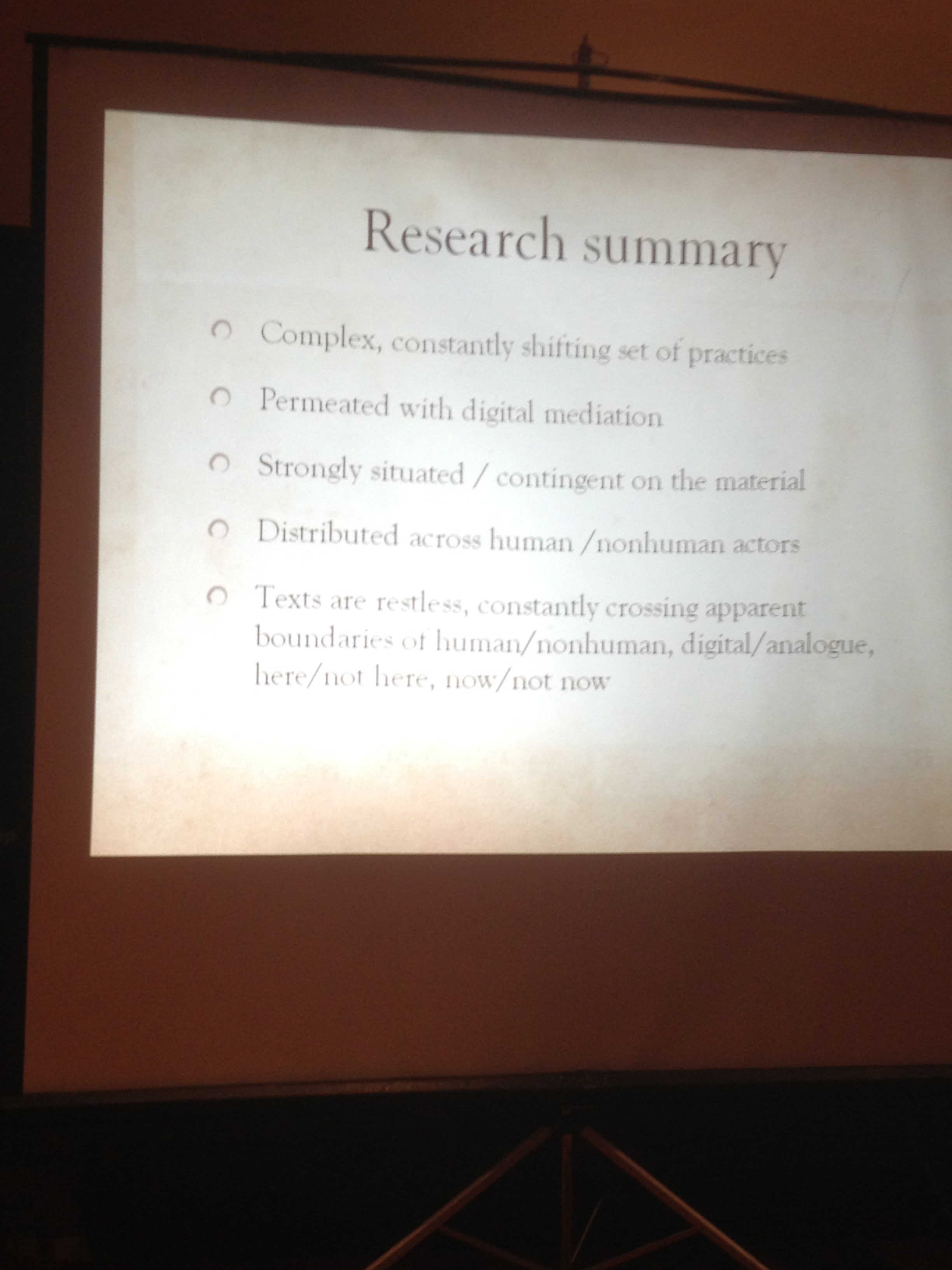
Here’s the bit I always like to see coming from Jisc funding. The changes to policy AND practice as a result of the work.
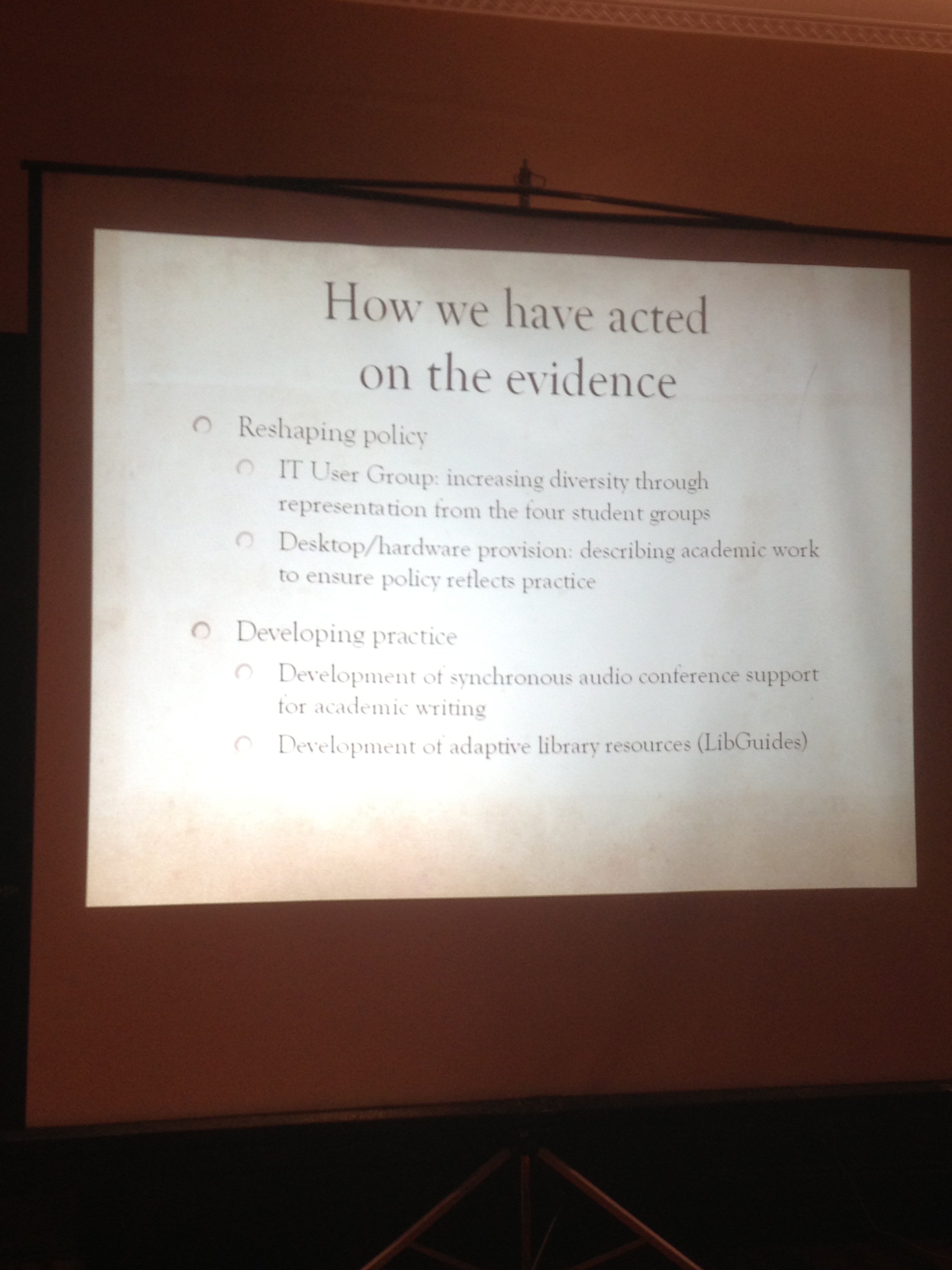
Great to see some genuine outcomes as well as outputs.
The exercise here was to draw out where you undertake your work, when, and with what. Here’s mine.
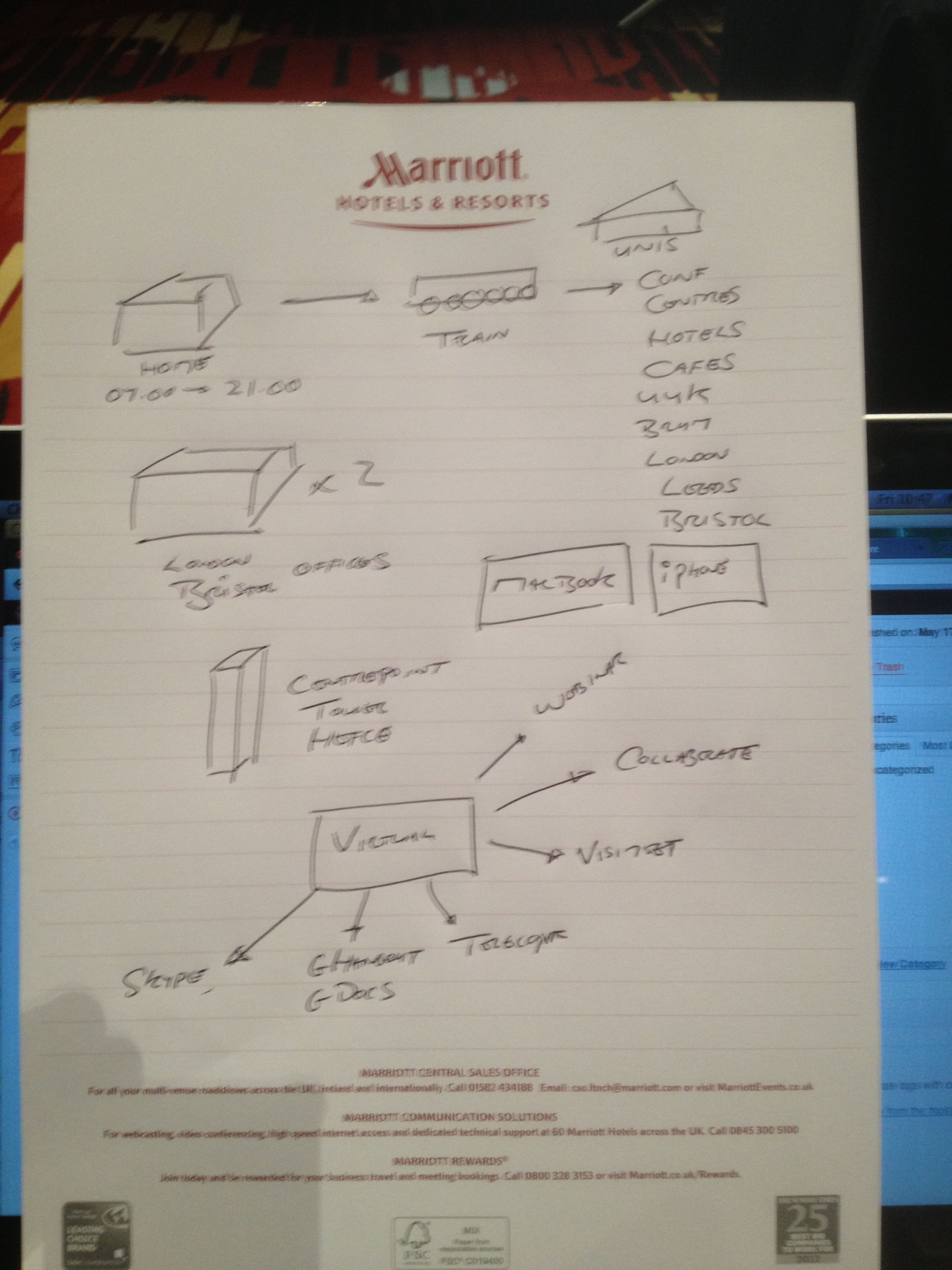
People here were very device focussed but for me the issues are about data availability and increasingly data synchronisation. Personally I find myself in the midst of a step change between cloud storage and access and local storage (in my case MacBook hard drive). The technologies don’t quite work to be entirely cloud based in my own experience and I think many people will find that step change phase, whether it be local to cloud or laptop to tablet an interesting area.
Further weight to that cloud issue is that there’s no free wifi here and zero 3G signal. I’m finding 3G less and less helpful and cotemplating giving back my Vodafone 3G stick. The solution today was to buy 24 hours of wifi. For a 1 day event at £15 that’s a bit steep but I find it very hard to work without a connection these days. And don;t get me started on access to power outlets!
Next up I’ve dived into a session on Alumni. Am really intersted in this area and have worked with colleagues to develop the Jisc Relationship Management InfoKit based on 3 years of funded work in HEIs. This piece is aimed at professionalising relationships between students, alumni and business with the institution.
Examples here of Alumni engagement include work experience / shadowing to open the door to a more formal placement. So Alumni as mentors and agents of placements. Alumni as motivational external speakers. Alumni as mentors.
Here’s the Jisc take on that (from the InfoKit Alumni section)
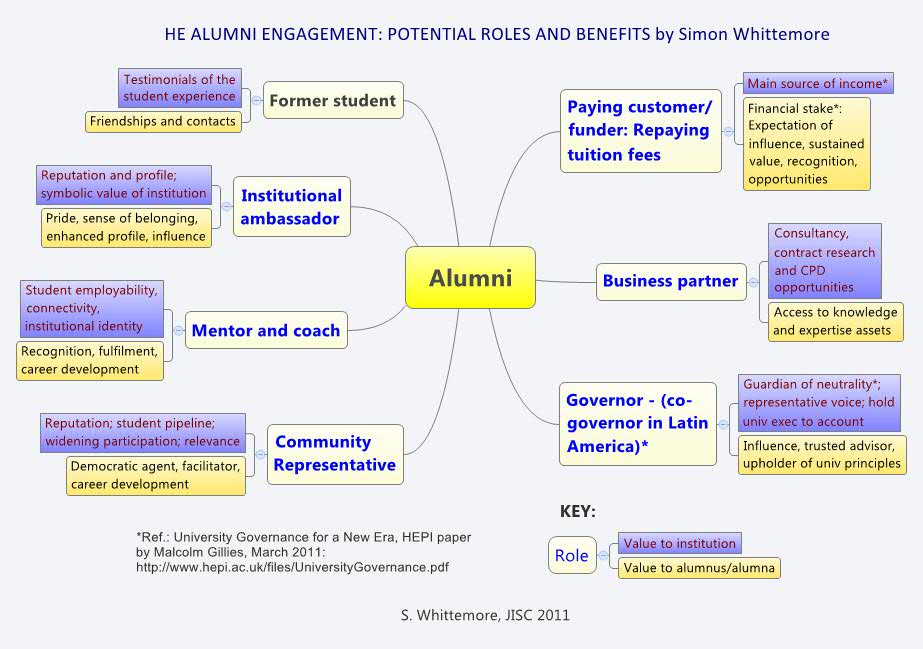
The presenter discussed an MBA course and how a mentoring scheme was introduced using Alumni volunteers. The incentive was that they University paid for mentors to be put through a professionally recognised course on mentoring so a tie in to their own CPD. Rather than document the process undertaken, I’ll pick out their use of the European Mentoring and and Coaching Council Guidelines at http://www.emccouncil.org which was adopted as a QA measure and more by the project.
This project focussed only on alumni as mentors to support first year MBA students on their assignments. I’ve been working with HEIs recently on employability issues. It’s a big thing at the moment for policy and decision makers and certainly funders, Government and certainly students as they find their own places. So a real asset to HEIs in todays competitive environment. Alumni could be used to mentor on employability issues, preparing students for employment practices be they my own example in the discussion session of digital literacies for employability such as remote collaborative working and the like. Or a co-participant who highlighted an alumni speaker from the NHS to nursing undergraduates who outlined the turmoil in the profession and failings of the NHS itself as employer. The group knee jerk on this was horror – don’t demotivate our students! Another take on this would be an opportunity for the HEI to act on this feedback and prepare their graduates to deal with the sorts of issues that were being outlined. Risks and mitigation, crisis and opportunity. My own feeling and this is borne out by the aforementioned Jisc work and InfoKit is that alumni relationships are underdeveloped and the opportunities to enhance graduate employability attributes as well as acting on that feedback loop to amend curricula, services and up skill lecturers themselves is ripe for the picking.
If you’re into Alumni Relations for Higher Ed you may find our recent case studies, videos and reports of use as well as our ‘Short of Time‘ section to help you get some quick insight into relationship management across the entire student lifecycle from pre-admission through to alumni.
The speaker dwelt on the difficulties of remote mentoring and a reliance on email and the finding that face to face worked better. I have to wander whether this was an opportunity for the Institution to help up skill mentor and mentee in remote collaborative working. That way the employer gains benefit through new working practices pioneered by the recent employee (alumni). I’ve often been in conversations about the lack of join up in HEIs between business leaders, ICT leaders and the resulting lack of effectiveness in business benefit fort investment in ICT. The idea of the recent graduate acting as catalyst between SME employer IT and Business Leaders for the same enhancement in impact of ICT to working practices was something I heard about this week in my blog of the Jisc Digital Literacy event.
So all good so far and we’ve grabbed a coffee to boot. I’m now in the presence of Professor Sir David Watson, Principal of Green Templeton College Oxford our Key Note speaker with the topic of Changing Values in Higher Education.
Here’s the outline
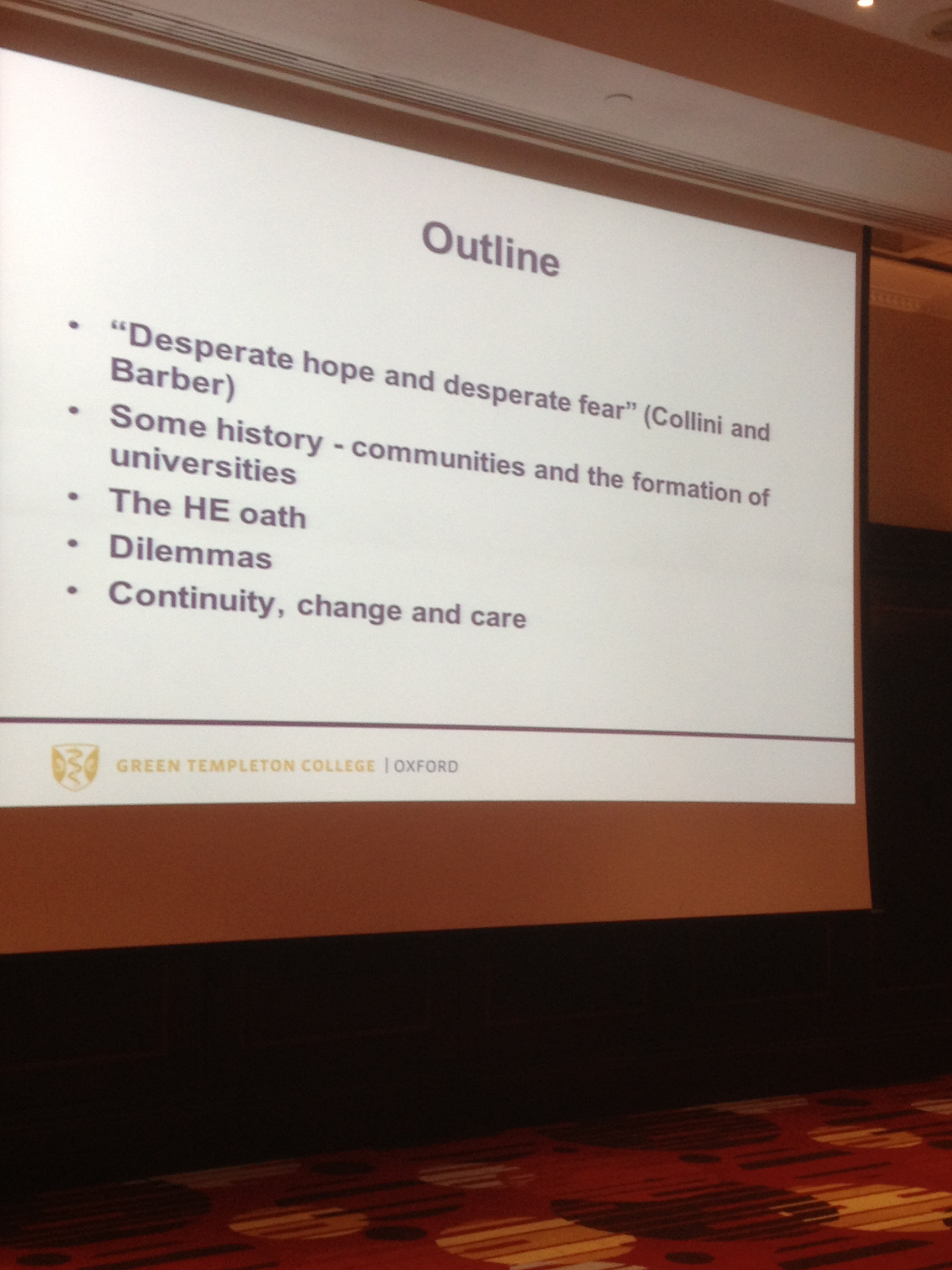
David describes his observations of the ‘temperature’ or ‘state’ of Higher Education in the UK; that it being a polarised view oscillating between desperate hope and desperate fear.
David mentioned a book that made great waves last year about the state of Higher Education in the Uk by Stefan Collini and notes it lacked the following
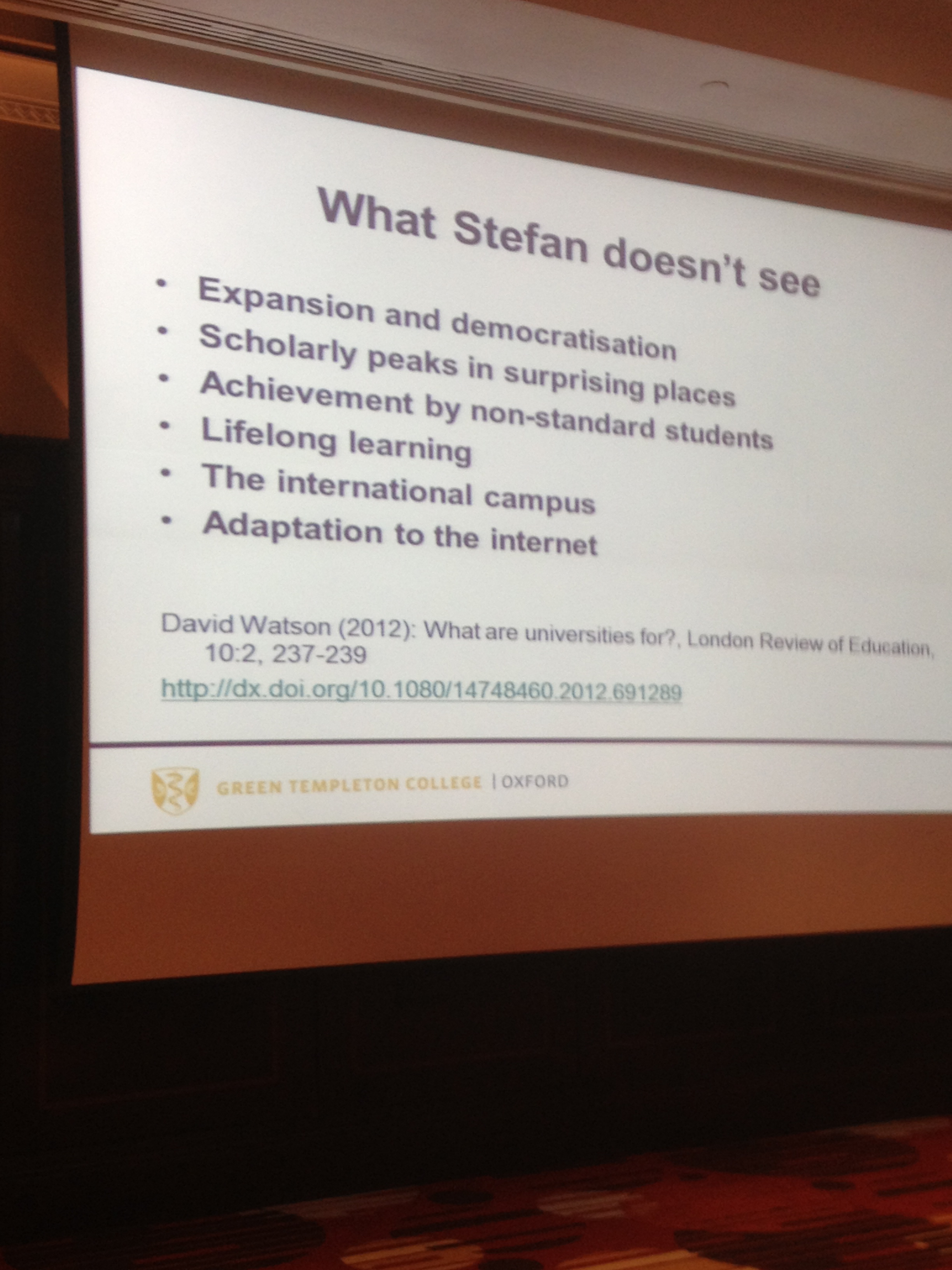
The last point reflects the HEPI announcement this week which outlined student disappointment in terms of traditional contact teaching time but failed to consider the digital interactions and anything beyond curriculum delivery in terms of the academic student experience.
Next to Michael Barber and his avalanche with a fairly damming observation of his previous 8 KPIs in Whitehall of which only 2 were met – waiting times in A&E at 4 hours (is this a good target and to what detriment medically is it met) and trains running on time (but often with journeys as slow as 100 years ago).
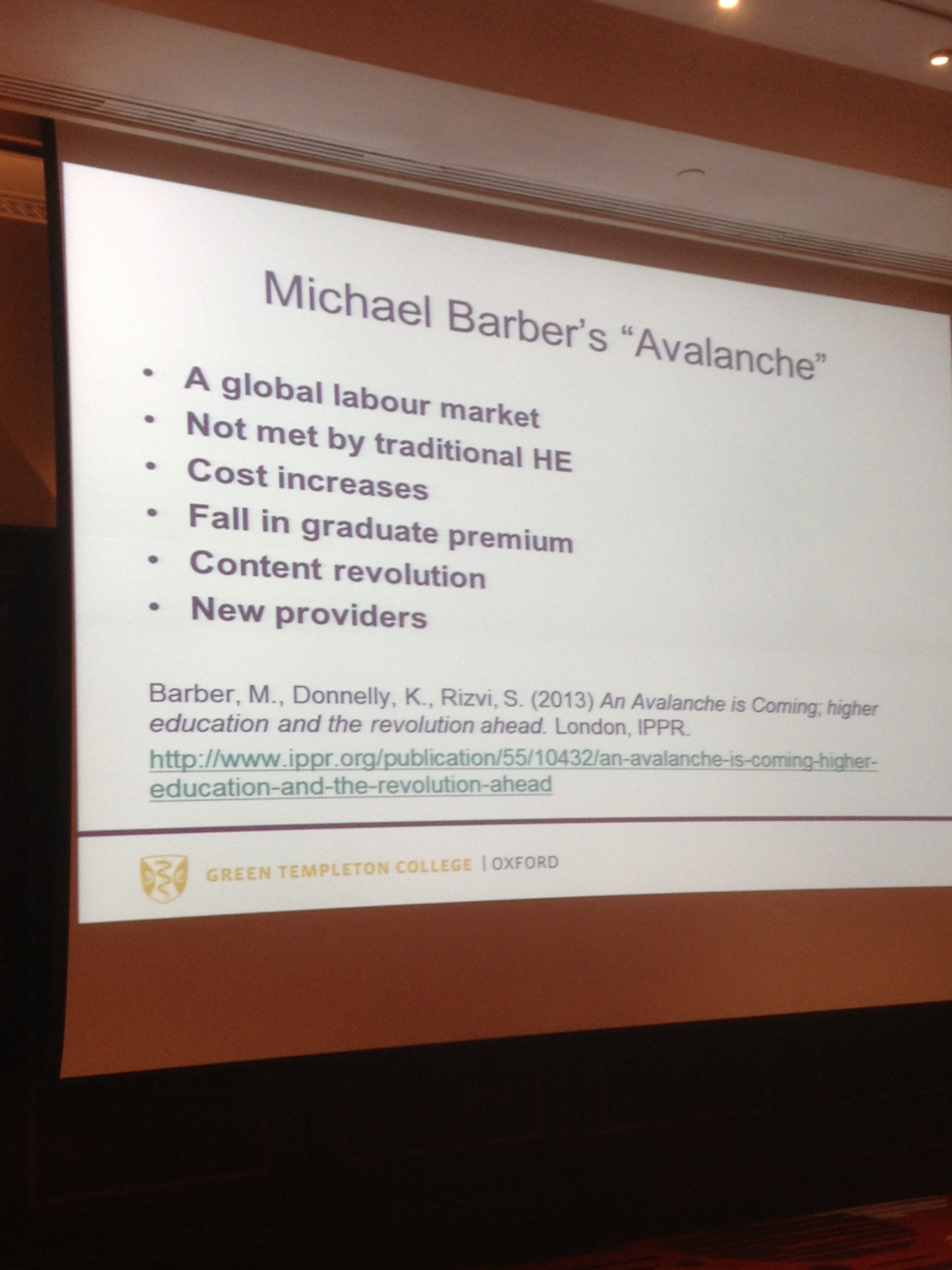
David Watson notes that ‘It’s very difficult to kill a University’. They tend to partner rather than close down. Therefore the sector doesn’t actually ‘do avalanches’.
Next up we hear about the geological nature of Higher Education development as strata being laid down and building on one another.
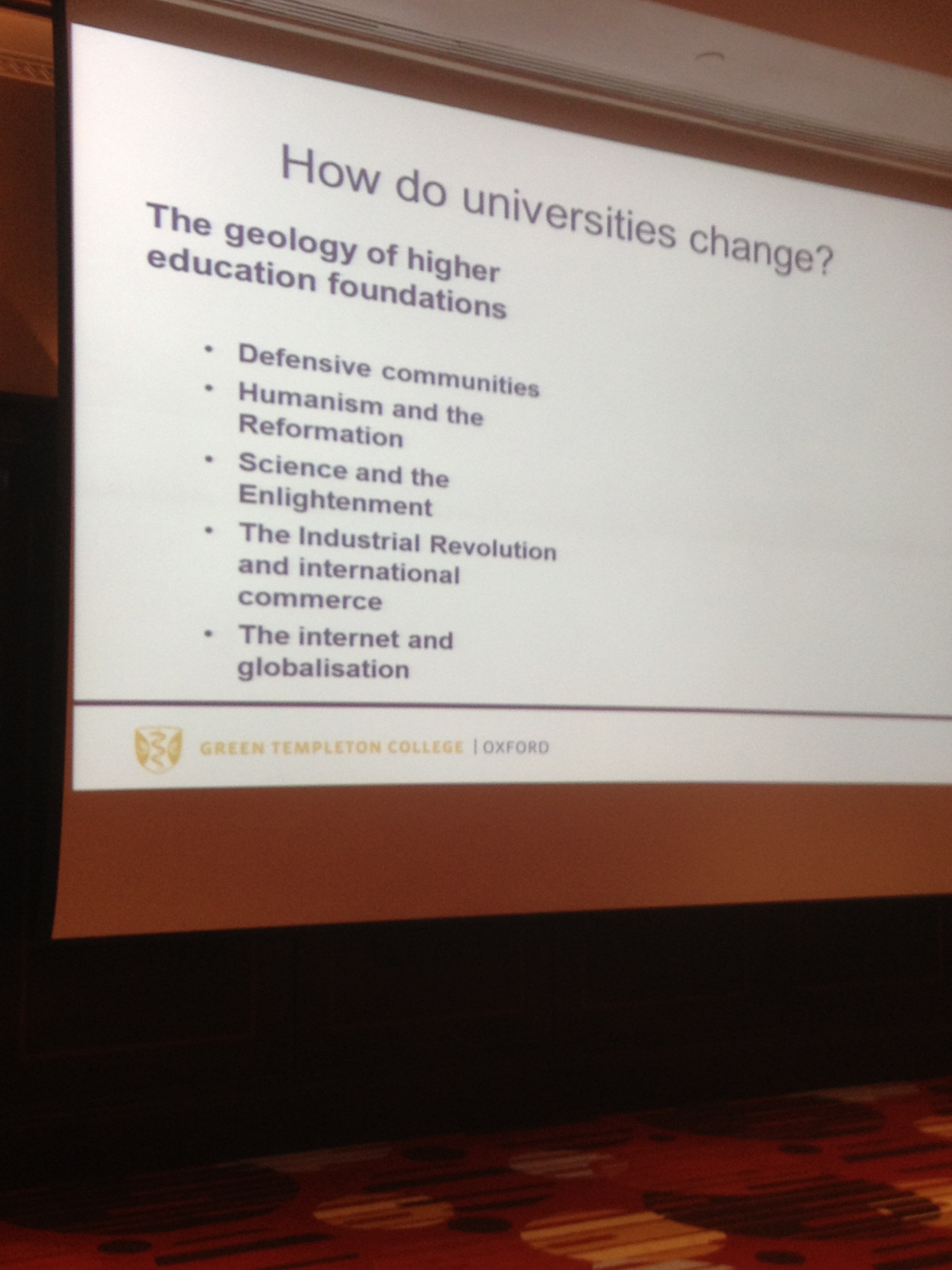
Humanism was introduced as a 16th century phenomenon. Science and enlightenment starting in the 17th century through to internet in the 20th of course.
An alternative model of HE change was introduced by the example of Matt Parker the UK Olympic Cycling Teams who was the team lead on ‘marginal gains’. Temporary creative cross development in higher education is the way in which Universities make progress.
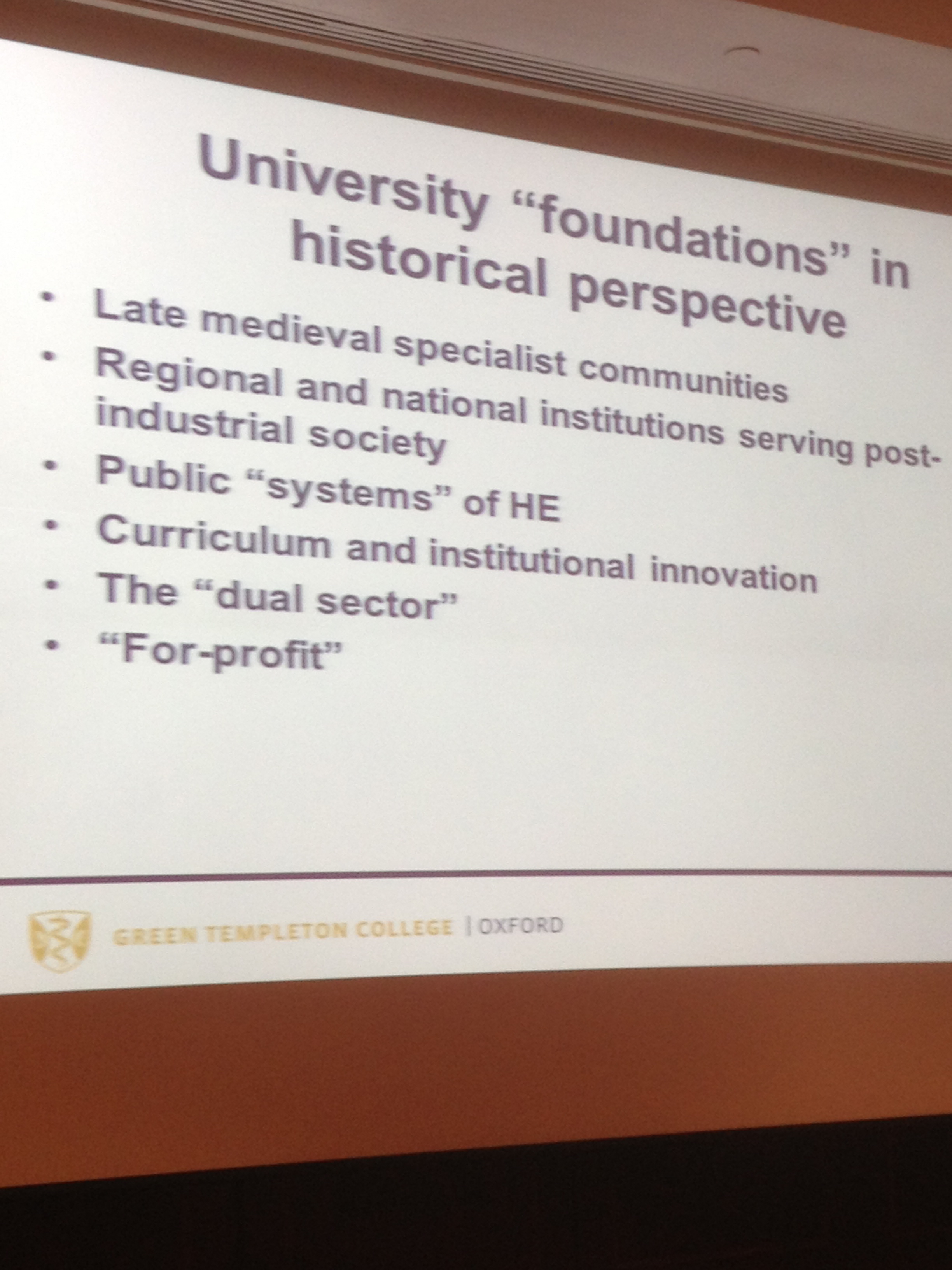
See the later trends of corporate profiteering in HE provision.
Next up a history lesson
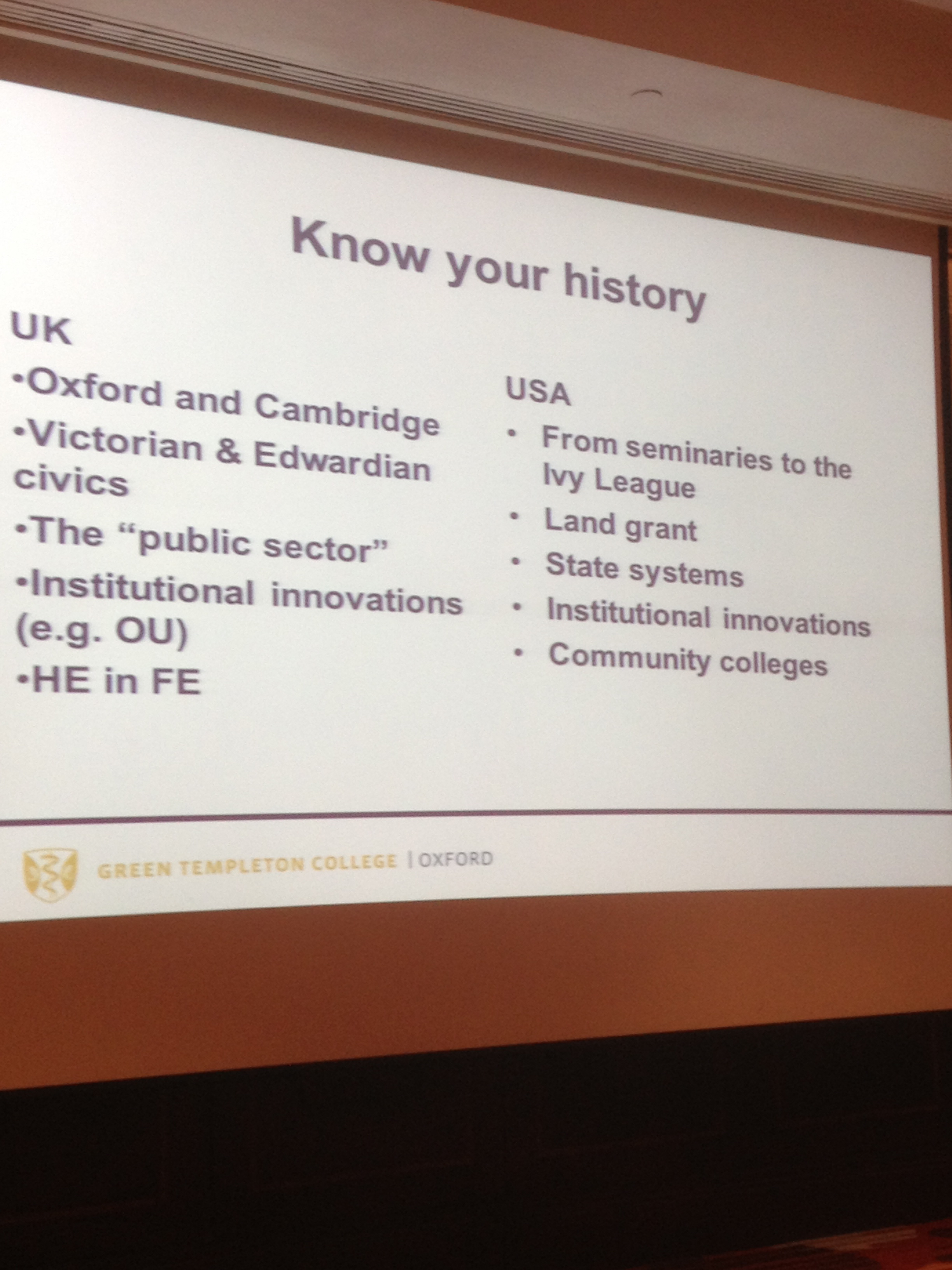
A note that US Universities tend to run a short compulsory course on history of the University itself.
Here are the claims Universities are making in terms of benefits to students. PDP and autonomous learning, competencies, exposure and creation of long term networks, time and space to learn and make mistakes with ivy on the walls, disciplinary activity without the drawbacks of commercial necessities
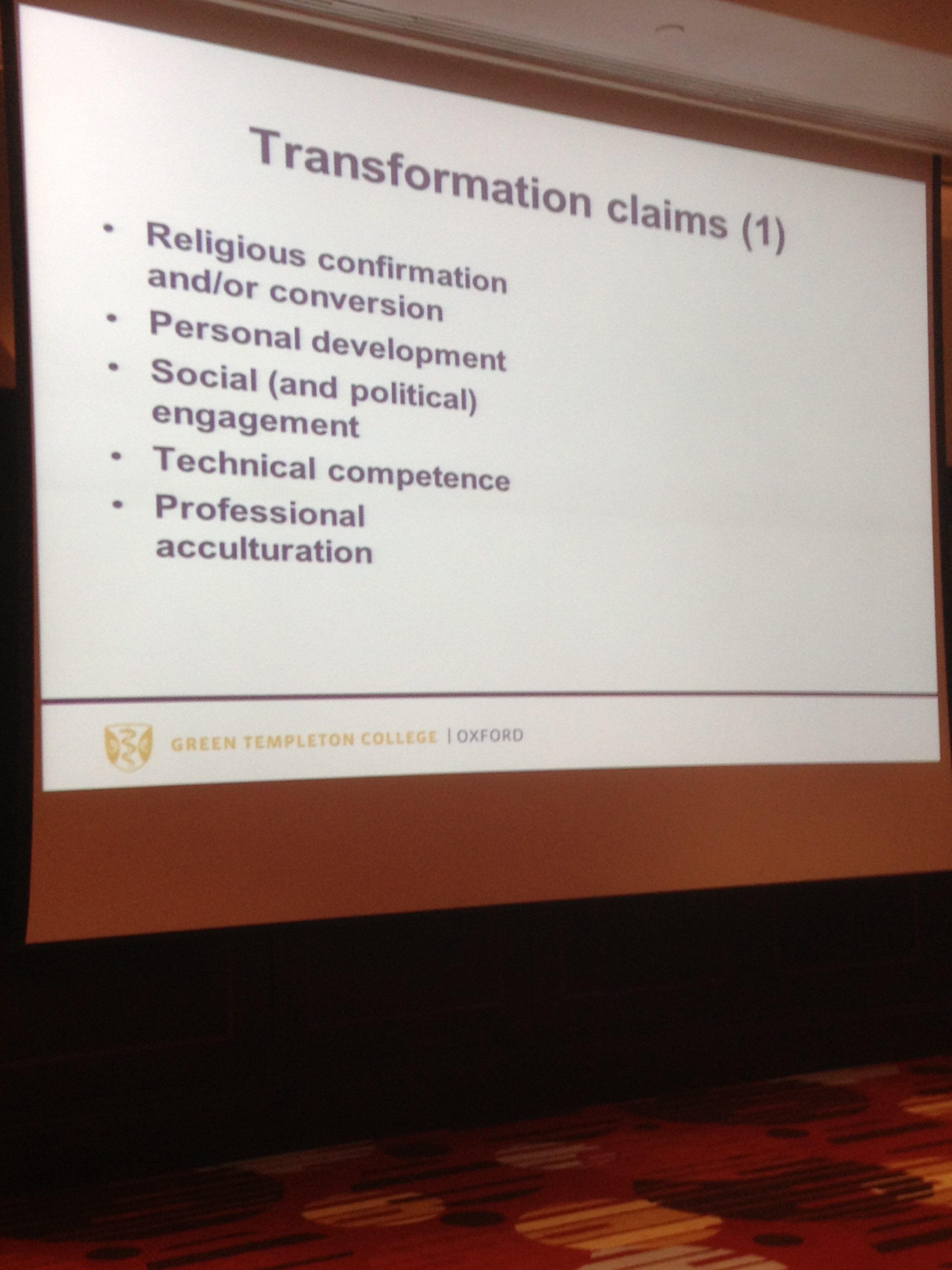
Quite difficult to comment on this talk as it’s very philosophical and I’m not! Here’s that perspective as described by our Key Note
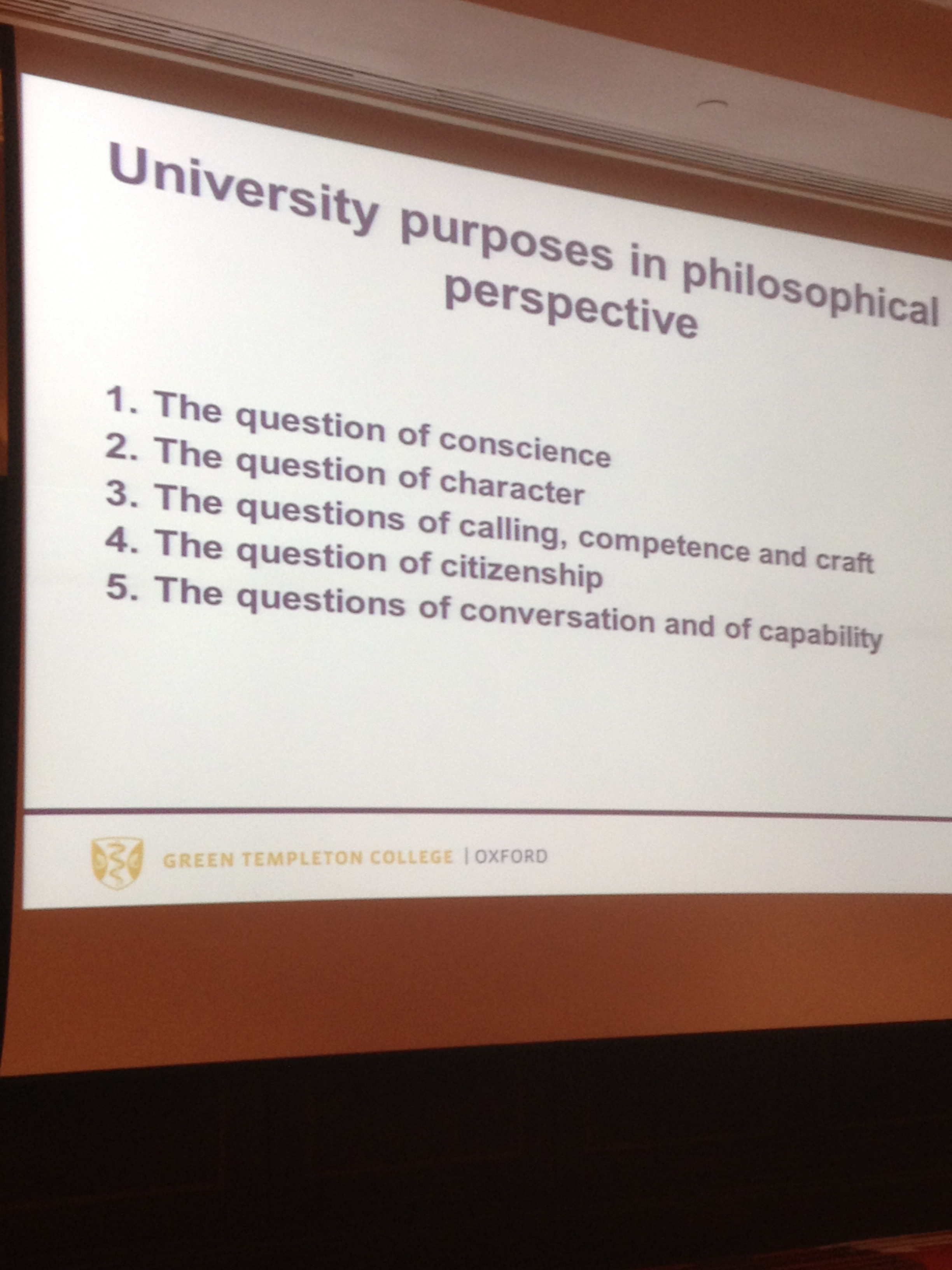
And a question – what is the Hypocratic oath of Higher Education? Well, isn’t that quite the question? Instead we’re given 10 commandments

Lastly (for the blog at least) here are some Dilemma phrases, note the cunningness applied in making them all begin with A
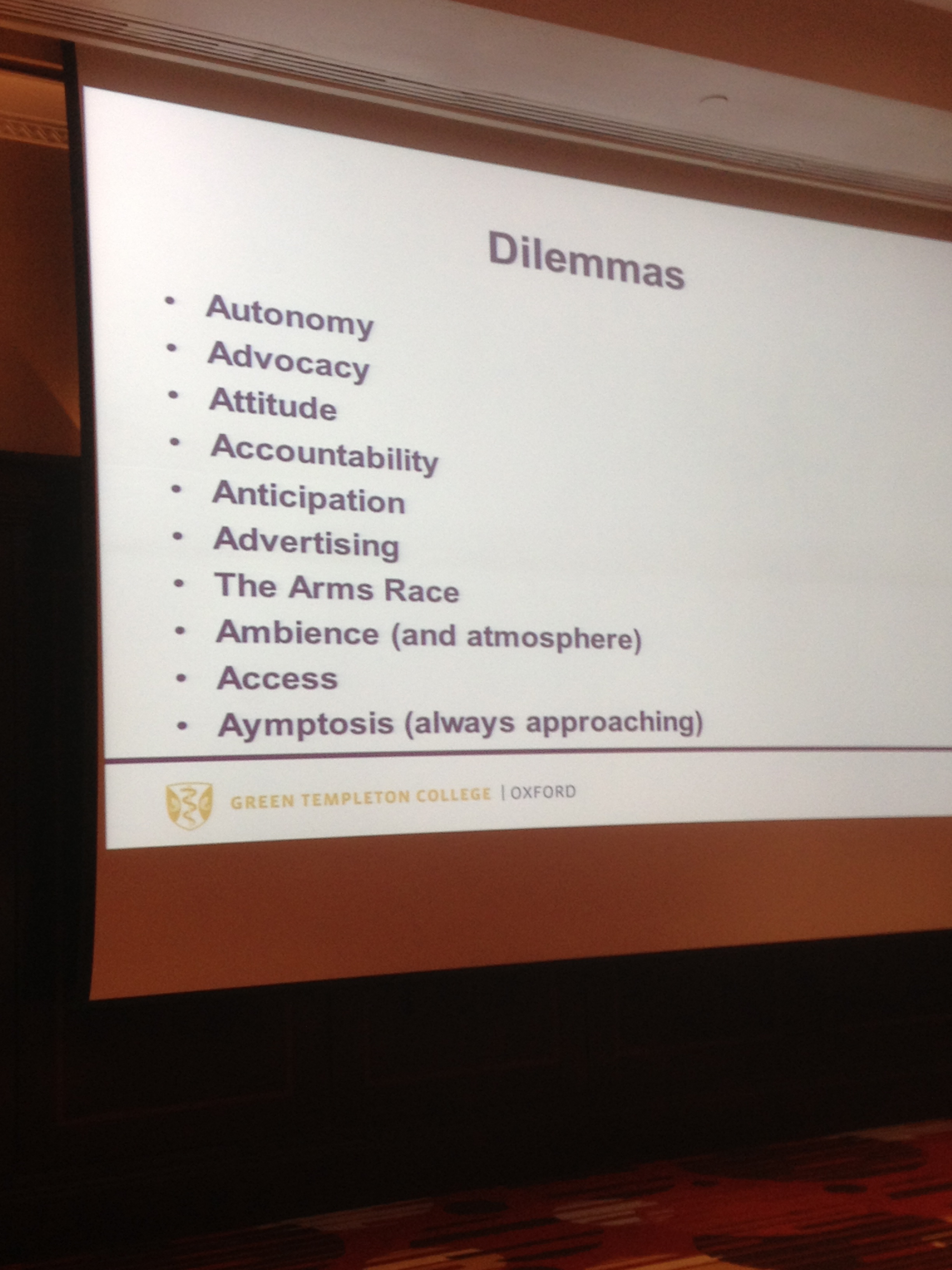
And now we have the Jisc strand on Digital Literacies chaired by Sue Thomson representing HEDG (Higher Education Developer Group).
First up we have Lindsay Jordan from University of the Arts London. Lindsay kicks off with a group discussion question ‘How do the academic development programmes in your institutions promote the development of digital literacy?’
Some excellent examples of impact and uptake here as people describe new initiatives as well as firm plans and intentions to embed digital literacy as core competencies of teaching practice and the support channels in place.
Lindsay went on to describe an initiative to encourage (compulsory so strongly encourage) creative blogging by staff and PGCERT students. Here’s Lindsay in full flow with a background of blog initiative structure. Constructive alignment was very evident.
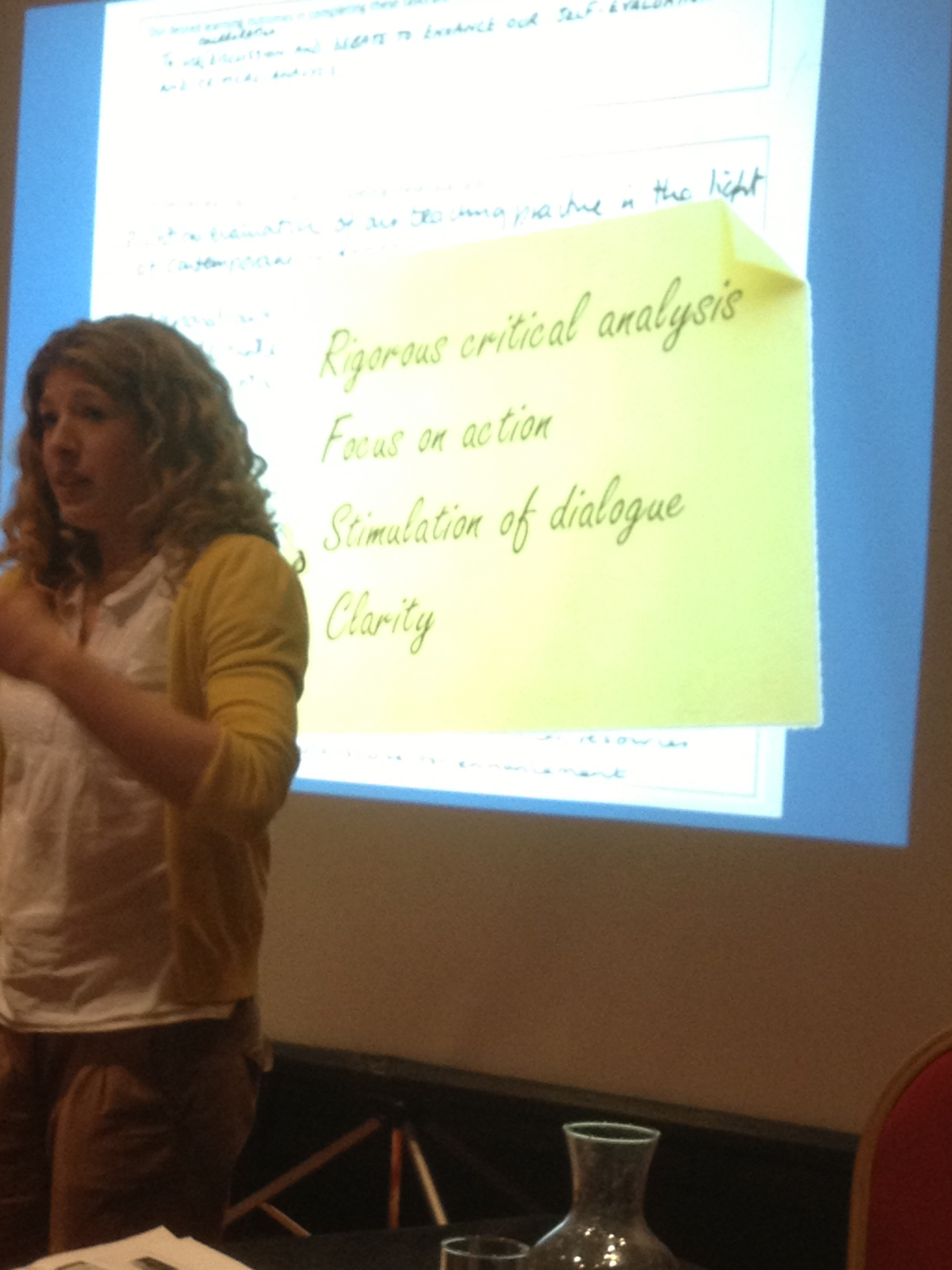
Here are Lindsay’s emoticon labelled results, self explanatory.
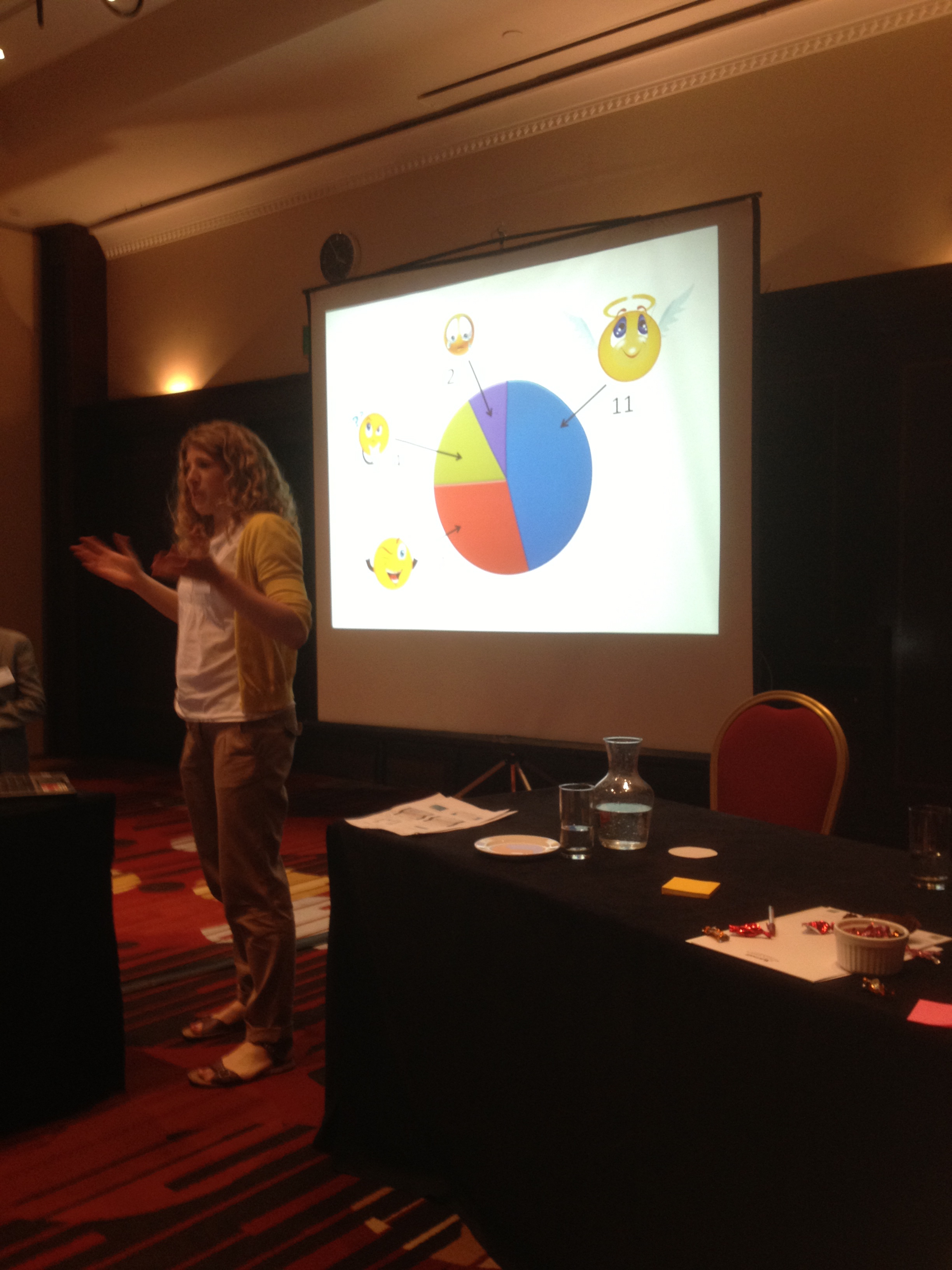
Great benefits here with techniques and examples to engage the unengaged – those negative to the digital literacy agenda are able to make great progress in up skilling as part of their teaching.
Next it’s David Baume. David did this great webinar on his Jisc funded work for the UK Professional Standards Framework in the digital university. This stuff is quite hot at the moment as Universities strive to put their teaching staff through HEA accreditation and UKPSF.
David talked about digitally literate organisations. Not great images from this position but you can about make out his thoughts.

Next David described the activities SEDA has used to embed the learning from the Jisc Digital Literacy Programme in its offers to members. There’s an incredible range of these and I’m personally very grateful for their efforts. My own reflection here and looking across the 10 professional associations Jisc funded to take part in the programme are that different organisations were at different states of readiness. Indeed each association undertook a baseline activity at the beginning to help target appropriate interventions and identify step change. At the heart of this is the SEDA SIG on technology enhanced practice. There’s a whole bunch of professional association stuff on the Jisc Design Studio. Though the themes and resources are probably the best place to look for wider impact and uptake.
Sue talked next about HEDG and digital literacy. Sue has spoken to me about how her own digital literacy has improved since being involved in the programme and is very supportive of the initiative. HEDG are trying to find a way of not producing more ‘stuff’ but to achieve uptake and change in practice.
Lastly we undertook a critique of each of the presentations considering how we might take the outputs and use them when back in the office.
Event ends, weekend begins 😉
Pingback: Presentation at the SEDA conference : Digital Literacies as a Postgraduate Attribute